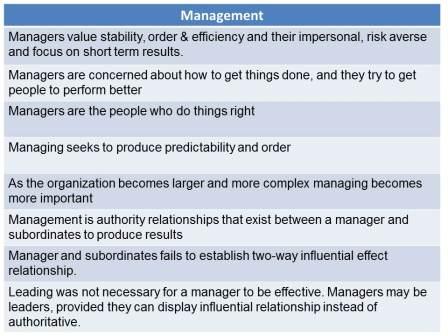Leadership & Management|Difference between leadership and Management
 |
| Image by Daniel Mena from Pixabay |
There is an unending argument about the difference between leadership and Management.
It is very much understandable that a person can be a leader without being a
manager, for example, an informal leader and a person can be a manager without leading.
Certainly, some people with the job title manager do not have any subordinates, for example, a manager of financial accounts.
Though nobody has proposed that
managing and leading are alike but the amount of similarity is a point of severe
disagreement.
Some writers like Bennis & Nanus (1977) opposed
that leadership and management are
qualitatively different and mutually exclusive.
However, the most exciting distinction assumes that management and leadership cannot happen
in the same person and both (managing
& Leading) differ with regard to their values and personalities.
Based on various authors following 8 differences are evident between Management & Leadership
Though the scholars have different viewpoints
for leadership yet it cannot be denied that both roles are necessary depending
upon the situation.
Hence, an appropriate balance should be maintained between -
management & leadership.
Excessive emphasis on the managing role may discourage risk-taking and create a bureaucracy
within a clear purpose. On the other hand, too much prominence on the leadership role can upset the order and
create change that is impractical.


Comments
Post a Comment
Please do not add any spam link in the comment box